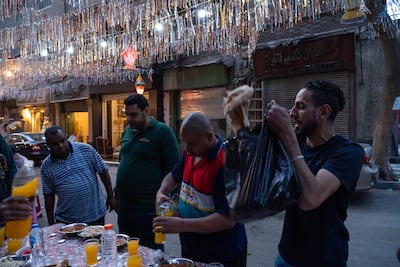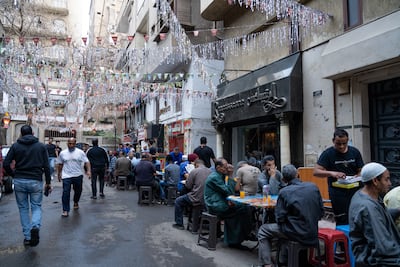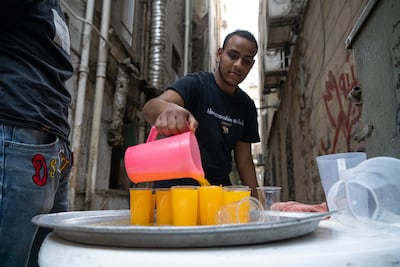Traditional charity iftars have resumed in Egypt after being cancelled for two years because of the Covid-19 pandemic.
Mawa’ed el rahman (or banquets of God the merciful in Arabic) are returning after many of Egypt's health and safety measures were eased this month.
A quintessential aspect of Ramadan in the Arab world’s most populous country, the once grand affairs are a little more low key this year.
Before the pandemic began in 2020, mawa’ed el rahman were hosted in large tents erected in conspicuous public places so they could attract a large number of people.

Inside the tents were tables at which dozens of the country’s poor would sit together to break their fast. This year, these events are being held in alleyways and side streets.
Mohamed Hamed, a server at a banquet in the affluent Cairo district of Zamalek, says one of his favourite parts of the job, which he has been doing every Ramadan for the past nine years, is to watch those who have been fasting sate their hunger.
He says it makes him proud to have given someone that experience during the holy month as he had missed seeing the happiness and satisfaction on the faces of those fasting for Ramadan during the hiatus.
“On a personal level, I was really excited this year to lay out the tables and chairs and actually host people for a group iftar, which is something that I missed during the last two years of Covid-19,” Hamed says.
In 2020 and 2021, charity work to feed the poor did not grind to a halt. Instead it was modified and pre-packaged meal dispensaries handed out takeaway boxes to the needy in Cairo with social distancing measures in place.
The government has this year eased most coronavirus measures, but also imposed new regulations on the meals that thousands rely on to feed themselves during the holy month.
Late last month, the country’s Covid-19 management committee decided that mawa’ed el rahman would be kept away from main streets to keep the traffic flowing.
Organisers of charity iftars have been instructed to reduce crowding as much as possible and make sure people are implementing preventive measures.

The government said only fully vaccinated people are allowed to eat at public iftars, although it remains to be seen if organisers pay heed to this edict.
Despite the resumption of the sit-down mawa’ed, many are continuing with the dispensary set-up because it is more cost-effective and requires no government clearance.
“I, like many others, really missed seeing the large tents lit up and the people crowding into them to break their fast. During the past two years with the pandemic, though our charity work continued, it was much more practical and less personal,” Hala El Wakeel, 53, tells The National.
“The pandemic made us update our methods and aside from the nostalgic little things we missed about the old tent set-up, the new way just worked much more smoothly, which is why many people have chosen to continue with it this year.”
A devout Muslim, Mrs El Wakeel co-runs a WhatsApp group of like-minded housewives, who organise large-scale charity drives all over Egypt. She says that many group members have adapted their charity work, making it more focused, less wasteful and more efficient.
“10 years ago, it was much simpler, we would set up tables and supply them with food at iftar,” she says.“But a lot of the time, much of the food would be left over as some fasters would only eat what they liked and leave the rest. So we began to think of more efficient ways to benefit the neediest fasters and their families.”
Her group, like many charities in Egypt, introduced a vetting process a few years ago to ensure those receiving the charitable meals were those who needed them the most.

Mrs El Wakeel says need is determined through a list of questions – such as where a beneficiary lives, whether their home is owned or rented and how many children they have.
“These are all factors that can be very telling with regards to a person’s need for help and we make a concerted effort to stay fair with this process,” she says.
“I really did miss the traditional mawa’ed but I do think the dispensaries make more sense, because it even gives beneficiaries more freedom. For example, they could half their meal for iftar and save the rest for later, or they could share it with someone they care about,” Ms Mohamed says.
“Not having to rent dozens of chairs or pay for decorations cut a lot of the old costs, which in turn, frees up more money to hand out more meals to the poor.”

